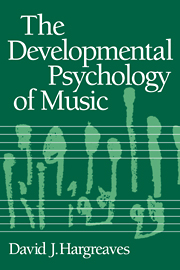Book contents
- Frontmatter
- Contents
- Preface
- 1 The developmental psychology of music
- 2 Children's thinking and musical development
- 3 Musical development in the preschooler
- 4 Musical development in the schoolchild
- 5 Development of responses to music
- 6 Creativity, personality, and musical development
- 7 Social psychology and musical development
- 8 Developmental psychology and music education
- References
- Author Index
- Subject Index
4 - Musical development in the schoolchild
Published online by Cambridge University Press: 27 August 2009
- Frontmatter
- Contents
- Preface
- 1 The developmental psychology of music
- 2 Children's thinking and musical development
- 3 Musical development in the preschooler
- 4 Musical development in the schoolchild
- 5 Development of responses to music
- 6 Creativity, personality, and musical development
- 7 Social psychology and musical development
- 8 Developmental psychology and music education
- References
- Author Index
- Subject Index
Summary
The previous chapter led to the clear conclusion that by the age of six or seven, children possess many of the fundamental skills required for full-scale musical perception and performance. Gardner (1973a) has made this point very forcibly, and has drawn from it the clear implication that Piagetian concrete operational thought is not essential for what he calls ‘participation in the artistic process’. This point was discussed in Chapter 2, in the context of Gardner's general view of artistic development. As far as music in particular is concerned, Gardner suggests that ‘a reasonably competent 7-year-old should understand the basic metrical properties of his musical system and the appropriate scales, harmonies, cadences, and groupings, even as he should be able, given some motifs, to combine them into a musical unit that is appropriate to his culture, but is not a complete copy of a work previously known. What is lacking is fluency in motor skills, which will allow accurate performance, experience with the code, tradition and style of that culture, and a range of feeling life’ (1973a, p. 197).
The studies of the development of song that were reviewed in the previous chapter bear out Gardner's conclusion, as does Dowling's (1982) overall view of the development of melodic information processing.
- Type
- Chapter
- Information
- The Developmental Psychology of Music , pp. 83 - 104Publisher: Cambridge University PressPrint publication year: 1986



